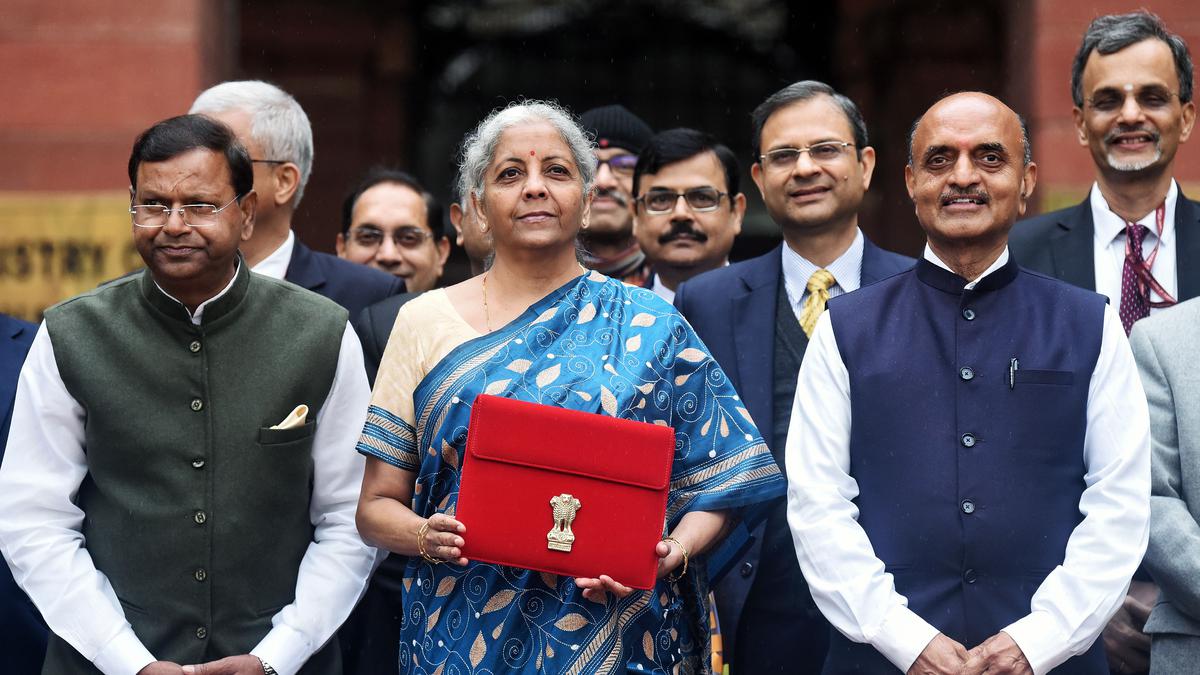The U.S. Federal Reserve is potentially making a mistake by relying on inaccurate inflation data to make policy decisions, according to a professor at Duke University.

The Federal Reserve is being misled by outdated inflation data and should not rely on the consumer-price index to make policy decisions, according to a finance professor, potentially leading to negative consequences for the U.S. economy.

The Canadian dollar experienced its biggest decline in nearly one year against the US dollar due to higher-than-expected US inflation data, which dampened investor hopes for early Federal Reserve interest rate cuts.
Americans are more optimistic about their financial situations in January 2024 than at any other time since the beginning of the pandemic, according to a survey by the Federal Reserve Bank of New York's Center for Microeconomic Data.

Rising beef prices in the US are being driven by limited supply due to drought conditions and the rising costs of maintaining herds, according to the American Farm Bureau Federation (AFBF). This comes as the latest Consumer Price Index report shows that beef and veal prices are up 7.7% compared to January 2023.

Traders lower expectations for a Federal Reserve interest-rate cut as Treasury yields surge after a report reveals sticky inflation in the US.

China's struggling economy is facing a crisis of confidence as both foreign investors and Chinese consumers are hesitant to invest due to a lack of faith, with concerns about deflation, youth unemployment, and a downturn in the real estate sector adding to the unease, although the government is pushing for a transition to a new, consumer-driven economy.

Pakistan's former Prime Minister Nawaz Sharif and his allies have announced that they will form a coalition government, ending the uncertainty following the recent parliamentary elections where no party won a majority; it is widely believed that Sharif will lead the new government.
Investments in factory building in the US, driven by the Biden administration's focus on strategic sectors like clean energy and semiconductors, have disproportionately benefited economically distressed counties rather than following traditional Democratic geography, according to a study by the Brookings Institution and MIT. These investments, fueled by federal legislation, are aimed at spreading industrial growth to regions that have been left behind.

Economically distressed counties in the United States are receiving a larger share of private sector investment in strategic sectors, such as clean energy and advanced industries, compared to their current economic output and population, indicating a departure from previous investment patterns. Smaller regions and micropolitan areas have secured a significant proportion of these investments, suggesting the need for intentional strategies to ensure inclusive economic opportunities for local workers and communities.

Russia's economic decline is in its early stages, as deep-seated financial issues, loss of human capital, and plummeting energy revenues continue to hinder the country's economy.
Shelter costs have unexpectedly accelerated, with the cost of homes rising and rental units in high demand, causing experts to believe that the Federal Reserve's decision on interest rates won't depend on the real estate market but rather on services inflation, which has also increased.

U.S. stocks plummeted as an unexpected rise in inflation threatens the Federal Reserve's plan to cut interest rates, resulting in the worst trading day in 11 months.

Stocks end lower as inflation exceeds expectations in the January consumer price index report.

Older adults are expected to receive a smaller cost-of-living adjustment (COLA) for Social Security in 2025 due to slowing inflation, with forecasts at 1.75% compared to this year's 3.2% increase, and it may fall short of the Congressional Budget Office's projected 2.5% increase; however, these estimates may change as more data becomes available, and a lower COLA could impact older adults who are still catching up from previous years' price increases. Additionally, more Social Security recipients are paying taxes on their benefits, and the number of people affected by this tax is increasing over time due to fixed income thresholds that have not been adjusted for inflation since 1984, resulting in a larger portion of taxable benefits as retirement income grows.

China's economic transition from the old economy to a new one is being prolonged, causing a lack of confidence from both domestic savers and foreign investors.
Stocks end lower as inflation comes in hotter than expected following the release of the January consumer price index report.

Mexico has become the top trading partner of the US, surpassing China and Canada, as companies increasingly relocate their operations to Mexico due to factors like the US-China trade war, logistical challenges during the pandemic, and Mexico's advantageous geographic position.

The Dow Jones Industrial Average and S&P 500 plunged as hot inflation data for January raised concerns about interest rate cuts by the Federal Reserve, with the Dow experiencing its worst day since March 2023.

Former Home Depot and Chrysler CEO Bob Nardelli warns that higher inflation and mass layoffs are threatening the U.S. economy, attributing the inflationary pressures to factors such as raw materials, transportation, and energy costs, and noting the increase in job cuts across various industries.

The Consumer Price Index (CPI) climbed 3.1% year-over-year in January, causing market volatility to increase, with small caps and other indices experiencing a pullback, while interest rates, the VIX, and the US dollar are on the rise, leading to a defensive stance in the market.
The cost of housing appears to be softening, as the shelter component of the Consumer Price Index (CPI) increased 0.6% in January, contributing to over two-thirds of the monthly increase, despite a deceleration in year-over-year inflation. However, shelter inflation has slowed and is expected to continue heading down slowly due to strong demand for all forms of housing and affordability constraints.
Rising Dining Costs Put Squeeze on Low-Income Consumers as Restaurants Face Pressure from Wage Hikes
The cost of dining out rose in January, leading more Americans to choose to cook at home, as labor inflation outpaces commodity inflation and minimum wages increase in many states. Fast food chains and restaurant brands are feeling the pressure, while consumer staples companies supplying grocery stores could benefit.
Russia's export revenues in 2023 decreased by 28.3 percent due to Western sanctions, Europe's decrease in gas purchases, and falling commodity prices, while imports increased by 11.7 percent, resulting in a decline in trade turnover of 19.4 percent; however, the International Monetary Fund predicts a better-than-expected 2.6 percent rise in Russia's GDP in 2024.

US inflation rose 3.1% in January, exceeding expectations and casting doubt on potential interest rate cuts by the Federal Reserve.

Lower prices may seem beneficial, but CNN explains why it can actually be bad for the economy.

Greater Cleveland saw growth in business and income but stagnation in job growth compared to other peer cities in 2023, according to a report by the Greater Cleveland Partnership.

Elon Musk warns that the US national debt is unsustainable and calls for an "adult conversation" on Capitol Hill to address the issue.

Nearly half of respondents in a recent Wall Street Breakfast survey do not trust the figures published in the consumer price index, suggesting a lack of confidence in government data and potential implications for investment strategies.

Despite the Federal Reserve's interest rate increases, the US economy has continued to thrive, with high demand for consumer goods and services, strong job growth, and little effect on inflation, leading to a potential delay in rate cuts and forcing the Fed to carefully time its next moves.

Cuba is experiencing frequent blackouts and a fuel crisis, leading to disruptions in daily life and the suspension of sports tournaments, with the government blaming US sanctions and economic problems, while experts suggest internal infrastructure and logistics issues may be the main cause of the fuel shortfall.

Fund managers no longer anticipate a U.S. recession, marking the first time in a year and a half, according to a survey by Bank of America, which also revealed increased optimism for a stronger global economy and a decrease in cash levels.

The U.S. experienced strong job growth in 2023, with some states like Nevada and Texas leading the way, while others such as Rhode Island and Iowa struggled; factors such as favorable climates and low costs contributed to job creation, but economists predict a slowdown in job gains for 2024.

The BJP-led government in India has presented an interim budget that focuses on fiscal consolidation, aiming to reduce the fiscal deficit and cut back on public expenditures, despite challenges in the economy and questions about the accuracy of growth estimates; however, critics argue that the government's macroeconomic narrative in the "White Paper" presented in parliament is based on cherry-picked data and evasions.

Atlanta Fed President Raphael Bostic expects the first interest rate cuts to occur in the summer, as he anticipates the US inflation rate to decline to "the lower twos" by the end of 2024.

European equity futures declined ahead of crucial US inflation data, while shares in Asia climbed and the yen fell; bond traders are more aligned with the Federal Reserve's rate trajectory, but strategists warn of overlooking the risk of rate increases following the easing cycle, while MSCI removed 69 companies from its China and Hong Kong global standard indexes in its quarterly review.

Wage growth in the UK slowed but still outpaced price rises, according to official figures, posing challenges for policymakers as they consider interest rate decisions. The number of job vacancies has also been falling, although there are signs that the downward trend may be slowing. The unemployment rate fell to 3.8%, the lowest level seen since the November 2022 to January 2023 period.

Pakistani-American economist Atif Mian warns of a dire economic situation in Pakistan with soaring inflation, escalating debt, and diminishing investment, urging the nation's leaders to prioritize recovery and address the pressing economic challenges.

Pakistan is facing significant macroeconomic challenges, including a fragile balance-of-payments, weakening growth, and rising prices, with the new government expected to address these issues by formulating a longer-term financing plan and securing an IMF bailout, though political uncertainty and the possibility of a weak coalition government could hinder economic reforms.

The US economy has outperformed other countries due to factors such as large-scale economic stimulus, a flexible jobs market, and energy independence.

The International Monetary Fund predicts that Nigeria's foreign reserves may decrease to $24bn by 2024, potentially leading to forex challenges for the country's economy due to factors such as a lack of new Eurobond issuances, significant repayments, and portfolio outflows.

The organised private sector, as well as states like Ekiti, Sokoto, and others, have criticized the Nigeria Labour Congress (NLC) for demanding a minimum wage of N1 million, stating that it is not realistic. The NLC president argued that the high cost of living and inflation have made their previous demand of N200,000 unrealistic. However, government officials and industry leaders are calling for a more reasonable approach to the negotiations, taking into account the economic situation and the ability of employers to pay.

Nationwide announced that it will be increasing interest rates on some mortgages by up to 0.25 percentage points, citing rising swap rates as the reason, while the average two-year fixed mortgage rate on the market experienced its largest monthly decrease since December 2022, according to Moneyfacts.

Dollar stores like Dollar General and Dollar Tree are cutting the size and quality of their products to avoid raising costs, resulting in higher unit prices and ultimately costing customers more in the long run. This strategy, known as shrinkflation, has allowed dollar stores to maintain high profit margins despite facing challenges such as inventory shrink. However, customers are becoming increasingly aware of shrinkflation and its impact on their purchasing power. Additionally, the expansion of dollar stores has led to the displacement of independent grocers and the creation of food deserts in low-income communities.

Americans are accruing record levels of consumer debt, with over $1.1 trillion in credit card debt, over $1.6 trillion in auto loan debt, and billions in personal loan debt, largely driven by the accessibility and acceptance of credit cards and loans, as well as the belief that credit cards don't represent real money; this high debt is not only a personal financial burden but also poses risks to the economy as it hinders economic growth, leads to inflationary expectations, and erodes confidence in the US dollar.

Atlanta Fed President Raphael Bostic does not expect rate cuts in the near future, stating that inflation's trajectory will be bumpy and slow and that the first move to lower rates would come in the summertime. Bostic acknowledges that the strong labor market could contribute to elevated prices, but he is cautious about making cuts until he sees more data confirming the endurance of current economic conditions.

Bill Maher shocked Jillian Michaels on his podcast by declaring that concerns about inflation are misguided, arguing that the United States "won the pandemic economically."

Warren Buffett recognizes the unfairness in America's capitalist system that has led to a widening wealth gap, proposing solutions such as increasing taxes on the wealthy and enhancing the earned income tax credit to address the imbalance without fully endorsing a wealth tax.

Traders in Kano State have resolved to reduce the prices of essential commodities following the confiscation of hoarded foodstuffs and public outcry over high prices and the cost of living.

A growing number of economists believe that interest rates are too high, with 21% thinking that the Federal Reserve's interest rates are "too restrictive"; researchers analyzing the effects of wealth taxes in Colombia found that the rich began hiding large amounts of their wealth to avoid paying taxes; Tuesday's inflation report is expected to provide the Federal Reserve with more confidence in taming inflation; early indicators show that consumers continued to spend in January, with core retail sales up 3.2% compared to the previous year; household views on personal finances and the economy are getting brighter as inflation decreases, but sentiments toward the labor market have dimmed slightly.
:max_bytes(150000):strip_icc()/GettyImages-1257482685-443bf2268f674dbcac0bfde6fae6f6a0.jpg)